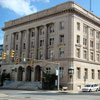Vacant Structures
The City of Charleston has determined vacant structures to be a fire hazard and attractive nuisance to vagrants that require additional cost, time and effort by Police, Fire and Building departments. As of Sept. 1, 2019, owners of vacant properties are required to register them with the Building Commissioner. Forms may be found on this website at right. Necessary information includes the location and type of structure on the property, the year it became vacant, if it is being actively listed for sale and owner information for inclusion on the Vacant Structure List (VSL).
Structures are defined as vacant if they:
- Have been vacant for more than 90 consecutive days and had an order issued by Municipal Court for a building or zoning violation not remedied for at least 30 days;
- Have lacked the habitual presence of human beings with a legal right to be on the property for at least 60 days;
- Have lacked all lawful business operations or residential occupancy for at least 60 days;
- Have had no owner in residence for at least 18 months (or with the legal owner not residing in another structure located within 300 feet for at least 60 days);
- Is not being actively marketed for sale or lease.
Building inspectors will annually review property exteriors from the VSL to make certain they remain weather-tight, secure from trespass, capable of safe entry by emergency personnel, do not present a public hazard and do not impede private or public rehabilitation efforts of surrounding properties. It is the responsibility of the owners to contact the Building Commissioner when a property is no longer vacant to have it removed from the VSL.
Owners are responsible for:
- Keeping vacant structures secure from unauthorized entry;
- Inspecting their properties on a regular basis to ensure code compliance;
- Keeping grass and weed growth below 10 in height, fallen leaves removed and sidewalks kept free of obstructions.
Owner(s) will be sent notice of any code violations found during inspections including what corrections are necessary and a time frame for corrections to be made.
If an interior inspection is needed to verify whether the structure is safe for emergency personnel to enter and does not present a public hazard, the owner is responsible for arranging a time for inspectors to come into the premises. If the owner refuses entry to inspectors, an administrative search warrant for an inspection may be obtained through Municipal Court by the Building Commissioner.
Inspectors will also review properties throughout the city for inclusion on the VSL that have not been registered. Owners will be notified and given the choice to either register or respond in writing to the Building Commissioner as to why the property should not be classified as vacant. If no response is given to the notice, the property will be added to the VSL after 30 days.
Owners disputing the Building Commissioner’s decision may appeal in writing to the city clerk, including the part of the decision he/she believes is inaccurate, within 15 days after the notice is issued. An informal hearing by the review committee will be held as soon as possible to hear the dispute. Owners will receive notice of the hearing and be given the opportunity to appear in person. The review committee will issue its findings and conclusions in writing either agreeing or rejecting the Building Commissioner’s decision. If the owner disagrees with these findings, he/she may then appeal to the Circuit Court of Kanawha County within 30 days.
New construction or active renovation projects are exempt from registration for 18 months. After that time owners may apply in writing for an extension to the Building Commissioner. Properties being actively marketed will be exempt for 6 months before requiring a written request for extension.
Vacant structures registered on the VSL will incur an initial fee of $250 for being vacant and a $500 fee if it is abandoned. Properties on the list for more than 12 consecutive months will incur a $1,000 fee with $20 added each day thereafter.
Fees will be invoiced to owners and if they are not paid, the City of Charleston may bring a civil suit against the owner for the unpaid amount and/or file a lien against the property per WV State Code § 8-12-16c(d)




